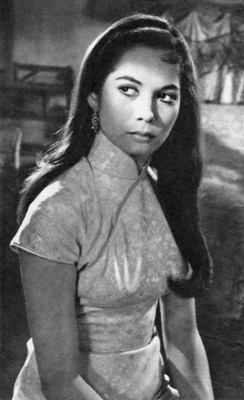 |
| Suzie Wong Revisited | © The Wall Street Journal, 4 June 1990 |
By WILLIAM MCGURN
It was the late 1950s, it was the Wanchai district of Hong Kong, and a Chinese bar girl was explaining to a tall, puzzled American that she could not possibly be the nice girl he'd met earlier in the day. "What a nice girl you met on ferry doing in a place like this I like to know for goodness sake,", she tells him, ending with her favorite expression. Her name, of course, was Suzie Wong, and the part would launch an unknown 21-year-old named Nancy Kwan into stardom.
|
Shortly after "The World of Suzie Wong," she put her Royal Ballet training to good use as the scheming nightclub performer Linda Low in Rodgers and Hammerstien's "Flower Drum Song." Like the goodhearted Suzie, Linda was somewhat pre-Betty Friedian in her outlook "It's nice to have outside accomplishments.... but the main thing is for a woman to be successful in her gender"); she sings the film's big song, "I Enjoy Being a Girl."
Ms. Kwan has gone on to prove herself decidely more diverse, having branched out into producing and writing in addition to acting. But she too enjoys what life's given her and thus has little time for modern complaints that the cheongsam she wore as Suzie Wong-- the traditional tight-fitting, high-collared, Chinese slit sheath-- was exploitative.
"I still think it's very feminine," she says, conceding, however, that "if you don't have the right figure, it accentuates all the wrong places."
Today home for Ms. Kwan is a modest ranch house tucked away in Sherman Oaks, Calif., far removed from the hustle and bustle of her native Hong Kong but filled with more Chinese pieces than the emperor's palace. Toward "The World of Suzie Wong" she exhibits a healthy indifference tinged with appreciation for the opportunity. It was, she says, "just a job," and indeed she tried out for the part on a lark only after director Ray Stark spied her hanging around her uncle's film studio during a school holiday from Britain. Of co-star William Holden, she has only praise for an actor who was "exceptionally generous" with others. "He was a man's man and a woman's man if you know what I mean, " she says. Her Cantonese upbringing compels her to add that he "was a good businessman, too."
For though born of an English mother and now carrying a an American passport, Ms. Kwan was raised a daughter of the Celestial Kingdom. Her Chinese name is Kwan Ka Shen, from a family that traces itelf back to Kwan Kung, a general so renowned for his uprightness that his red-faced visage adorns many a police station and shop. She relates how, as a young student, she had intended to join a demonstration against one of the many British-run Hong Kong clubs that wouldn't allow Chinese as members. Her father, a famous local architect, asked her not to, and out of filial piety, she did what any Chinese girl would have done. She obeyed.
Not long after "The World of Suzie Wong" made her a star she left Hong Kong for work reasons but returned in the 1970s to start up a production company called Nancy Kwan Films. In the interim she's also kept up her acting career, appearing in everything from the pilot for the old TV series "Hawaii Five-O" to "Miracle Landing," the recent CBS docudrama about the 1988 Aloha Airlines flight that survived losing its roof in midair. It's been three years now since Ms. Kwan's visited Hong Kong, but she eagerly quizzes a former resident about prospects come the 1997 transfer of sovereignty from London to Beijing. Like most Chinese, she is glad to see the end of colonial rule; like most Hong Kong Chinese, she has her worries. "I am Chinese and the Hong Kong people are Chinese," she says, fingering a jade bracelet. "Nevertheless, I wouldn't like to see its special identity swallowed up by China."
|
For simliar reasons she also is pleased about her upcoming part in Frank Vinh Noan's "Endless Love." The story revolves around an American separated from her Vietnamese husband and infant daughter by the fall of Saigon, and Ms. Kwan plays the Chinese-Vietnamese U.N. official fighting to bring them back together. In the process she falls in love with a well-known antiwar reporter now feeling some guilt pangs about the consequences of the American defeat there. What makes this film different from the dozens of others about Vietnam is that this is the first seen through the eyes of a Vietnamese. In addtion to landing one of the lead roles, Ms. Kwan will be co-producing the project, to be shot this summer, probably in Thailand.
Too soon the interview winds down, and it comes time to ask for an autograph. Admitting to some wariness about the press ("words never seem to turn out the way I said them"), she nonetheless takes pen in hand and bends over a photo, a formal portrait of her grandfather dressed in his imperial robes. "A word is worth a thousand pictures," she writes, and a reporter suggests that while flattering, it's probably untrue. The observation draws a mischievous smile. "Of course it's not true," she says.
For goodness sake.
Mr. McGurn is Washington bureau chief of the National Review.